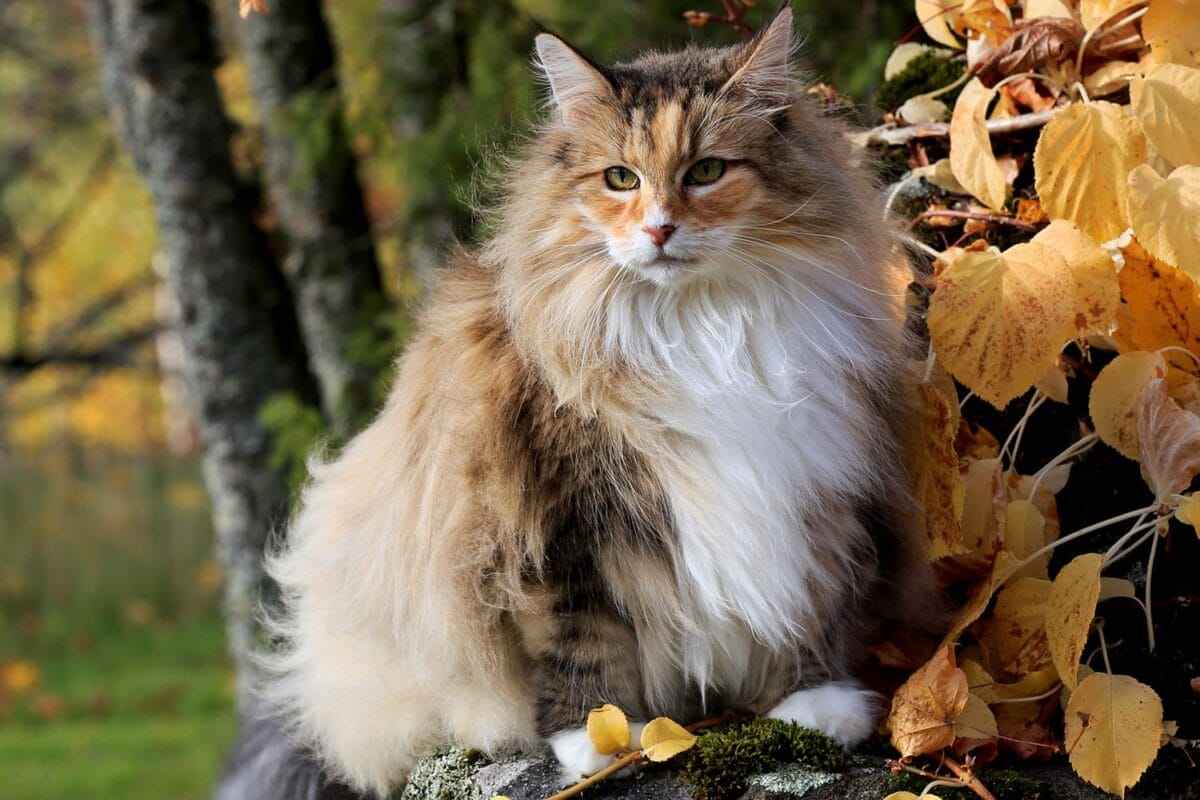Exploring the Enigmatic Norwegian Forest Cat Breed
The Norwegian Forest Cat, a naturally occurring landrace breed hailing from Norway, boasts a rich history spanning over a thousand years. Revered by Vikings for their prowess as mousers and cherished by farmers as loyal working cats, these felines have seamlessly transitioned to becoming beloved family companions in modern times.
Introduction to the Norwegian Forest Cat Breed
Originating from the dense forests of Northern Europe, the Norwegian Forest Cat has evolved over centuries to thrive in cold climates. Endowed with distinctive features such as water-resistant double coats, robust bodies, bushy tails for balance, and tufted paws for snow traction, they are a testament to natural adaptation. Their intelligence and amicable personalities facilitated harmonious coexistence with humans. Although the breed faced near-extinction during World War II, dedicated Norwegian cat enthusiasts embarked on a revival mission in the 1930s. Today, these cats maintain their working cat versatility while embracing their roles as cherished indoor family pets.
The Norwegian Forest Cat is characterized by:
Appearance:
- Large muscular body
- Long water-resistant fur
- Large tufted paws
- Bushy tail
- Oblique green eyes
Characteristics:
- Intelligent
- Gentle
- Adaptable
- Athletic
Popularity: Moderately popular, especially in Europe
Temperament: Independent but affectionate, energetic but undemanding
Lifespan: 14-16 years on average
Coat colors: Every color and pattern is accepted; common colors include white, black, tabby, and red/ginger
Breed Type: Considered a native landrace breed rather than a crossbreed, adhering to strict breed standards.
Caring for a Norwegian Forest Cat
Food:
Norwegian Forest Cats thrive on high-protein, grain-free foods. Canned and raw foods support urinary tract health, and daily portions should match their activity level to prevent obesity.
Environment:
This energetic and intelligent breed flourishes in environments offering ample vertical space, engaging activities, and views of nature. Cat trees, puzzle toys, scratching posts, wand toys, and food puzzles contribute to their happiness.
Grooming:
Regularly brush their long-haired coats thoroughly yet gently using a de-matting comb. Trim nails as needed, check ears and teeth, and ensure an annual vet visit.
Care Methods:
Respect their independence while providing ample affection. Engage their athleticism and intelligence through daily play and training sessions. An enclosed catio or leashed walks allow them to explore the outdoors safely.
Adopting a Norwegian Forest Cat
Popular Regions:
Northern Europe, United States, United Kingdom
Average Price:
$600 – $1200 USD through ethical breeders; adoption fees typically under $100.
Rescue Groups:
Norwegian Forest Cat Rescue League, Norwegian Forest Cat Club Rescue Network
What to Review Before Adoption:
- General health and weight
- Current vaccination records
- Prior medical conditions
Preparing for a Norwegian Forest Cat
As highly intelligent and energetic cats bred to thrive outdoors, Norwegian Forest Cats require ample vertical space, toys that challenge their problem-solving skills, cat trees and scratching posts, daily playtime, and access to outdoor enclosed spaces or leashed adventures. Preparing tempting, healthy foods high in protein and moisture, along with setting up engaging play spaces, ensures your cat remains mentally and physically stimulated.
Essential Supplies:
- Cat trees and floor-to-ceiling cat shelves
- Interactive wand toys and food puzzle toys
- Ceramic or stainless steel food and water bowls
- Litter boxes and scoop
- Slicker brush and de-matting comb
- Cat carrier
Common Health Issues:
- Hypertrophic cardiomyopathy
- Hip dysplasia
- Glycogen storage disease IV
Core Vaccines:
- FVRCP
- Rabies
- Feline Leukemia
Norwegian Forest Cat Names
Regal mythological names like Freya, Loki, and Astrid, or Norwegian names like Oslo, Solveig, and Henrik, suit this noble breed perfectly.



Không có nhận xét nào